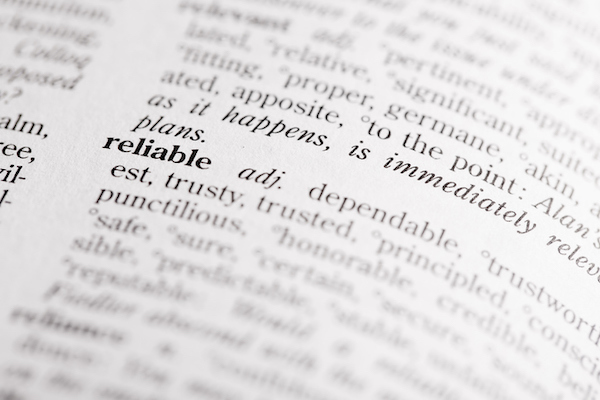Seems like a simple question, where one’s immediate reaction is “of course, I am.” On further reflection, many of us may recognize the opportunity to improve our reliability or to coach others.
In previous blog posts, I wrote about how “transformation starts with I” and shared five characteristic traits that are worth developing to support you on your personal journey. Reliability is another attribute that breeds the courage and poise needed to grow, develop, and take on fresh experiences.
When you are reliable, people can depend on you.
This links to trust – one of the – if not the most – essential component of stable and healthy relationships. Depending on where you fall on the reliability scale, from being a no-show to the person everyone counts on, the good news is that there are plenty of ways to improve. I recently read “8 ways to become the most reliable person in the room” and “How to be a reliable person.” They are great reads on what you can do to foster better behaviors and habits.
My top three actions center on honesty and respect.
1. Manage expectations
Under-promise and over-deliver. When you make a promise or take on responsibility, be realistic about when and what you will deliver. Don’t fall victim to people-pleasing. Practice learning how to say no in a precise, kind, and direct manner. Do what you say you are going to do. If you tell someone you will deliver a project by the end of the week, do so. If you can’t, go back as early as possible and ask for help or share alternative ways to reach a similar outcome.
2. Proactively communicate
Don’t leave others hanging. Avoid surprises. Respond to inquiries and emails within 24 to 48 hours, even if it’s just to say, “I received your message and will get back to you later this week.” Don’t make excuses. Prioritize your day and choose an appropriate time to block out your calendar to manage your correspondence. Make sure you have a system to remind you of what you’ve committed to. A little organization goes a long way.
3. Be consistent
Consistency is a big part of reliability and trust. Don’t let circumstances dictate your behavior. Show up and be present. People can trust that you will do what you say you will do. If you tell people you will be there, be on time or notify them if you are running late. If something else arises, still keep your commitment or at least be open, honest, and apologetic if the change is necessary. Your values and ethics should not be contingent upon circumstances.
Although these are my top three, they can vary by individual. You owe it to yourself, your career, and others to be reliable.

